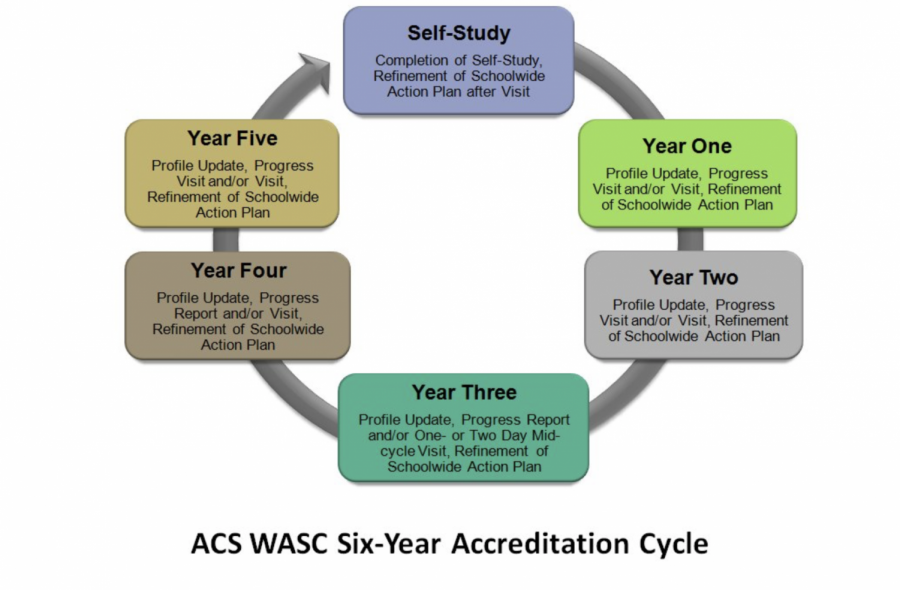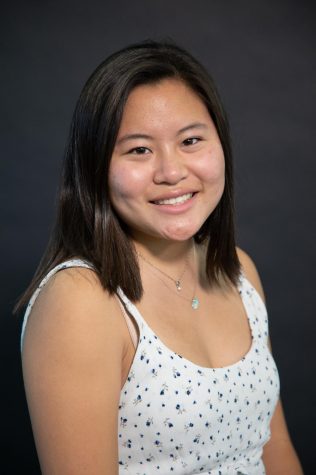An Overview of Menlo’s Accreditation Results
March 7, 2019
As the culmination of its accreditation process, Menlo was recently given four major recommendations for the school’s future improvement, along with many notable strengths.
The accreditation process is an ongoing cycle that every school must go through. It is indicative of an institution’s achievements and areas for growth. Menlo’s accreditation process is monitored by the California Association for Independent Schools/Western Association of Schools and Colleges (WASC).
According to the WASC website, an accreditation allows a school to “demonstrate the capacity, commitment and competence to support high-quality student learning and ongoing student improvement.”
Schools can receive accreditation terms lasting one (“immediate change & action required”), two (“urgent attention & action required”) or seven years. In the final year of the accreditation cycle, schools must submit a self-study. The self-study is a self-evaluative report that a WASC team of California independent school educators reads before visiting campus to look closely at the school’s programs and operations. Finally, the team presents a schoolwide action plan that the school interprets and follows until the next accreditation term.
In the fall of 2017, every member of Menlo’s Middle and Upper School faculty began working together to compile the self-study. Upper School history teacher Katharine Hanson was the self-study coordinator, and Upper School History Department Chair Ryan Dean was the deputy director. Along with Head of School Than Healy, the two spearheaded the self-study.
“[I was] responsible for working with faculty, staff, administration, parents and students to address about 100 questions set by [WASC], [putting] together the written self-study report, [filing] it on time, [coordinating] meetings with the visiting team when they arrive[d] and [helping to] ensure a good and transparent process,” Hanson said.
“I served on the eight-member Steering Committee that oversaw the strategic planning process for the school’s self-study and co-coordinated the self-study report research and writing process,” Dean said. “I was one of three individuals—Mr. Healy and Ms. Hanson being the others—who read the entire report.” Dean wrote and edited about a quarter of the self-study.
Ten committees worked on the self-study, each focusing and reflecting on a different aspect of Menlo. Committee examples include: “Mission, Climate and Community,” “Student Learning” and “Faculty, Pedagogy and Teacher Effectiveness.”
The self-study was completed in November 2018, about a year after the first planning meetings occurred.
On Wednesday, Feb. 13, a visiting team from WASC gave an oral summary of their findings to the Middle and Upper School faculty. Ultimately, the WASC team provided Menlo with four major recommendations for future growth. Three fell under the “Teaching and Learning” section, while the last was in the “Institutional Stewardship and Leadership” section.
The recommendations may still be modified before the final report is sent to Menlo. In draft form, they are: that the school revisit and clarify its definition of diversity while identifying benchmarks and best practices that promote a sense of belonging for all students; that the faculty and the administration continue to explore best practices for assessment to mitigate against the students’ transactional mindset regarding grades and expansive transformational learning; that the school strengthen individual alignment in support of an integrated student experience encompassing curriculum, assessment, philosophy, equity practices and social-emotional learning goals; and that the school leadership continue to be mindful of the impact of change, tending to culture and leading with joy, optimism and care.
Menlo will definitively find out its accreditation term in the summer. Three years from now, Healy will write an interim report to update WASC on the work Menlo has done to respond to the four major accreditation recommendations.
“Menlo has undergone substantial change over the last five years, and our self-study provided an opportunity to take stock of how these changes took place, their present status and the next steps Menlo should take in order to continue to evolve as an institution,” Dean said. “From a regulatory standpoint, an accreditation means Menlo gets to continue to enjoy the respect of the community it serves, that [students’] diplomas will continue to hold their value, that more families will continue to see Menlo as an excellent choice for years to come and that the hard work of faculty and staff has been recognized by fellow educators.”



